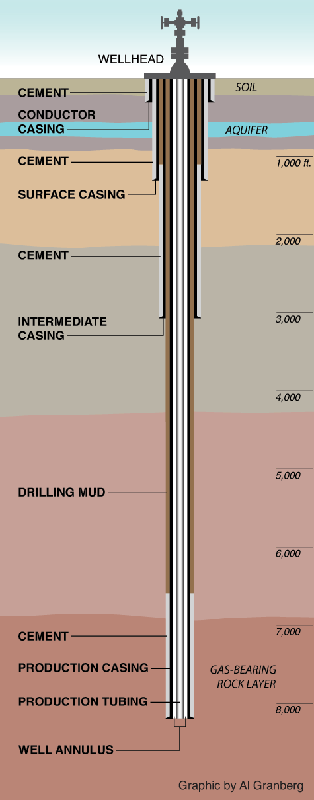
Tax Law Blog
Foster Swift successfully reverses a $500,000 use tax assessment in Arrow Energy Services, Inc. v. Department of Treasury (MTT No: 404349).
Facts of Case
In 2008, the Department of Treasury audited Arrow Energy for use tax compliance. Arrow Energy is an oil and gas servicing company. During the period of the audit, Arrow Energy was primarily engaged in turnkey operations whereby Arrow Energy utilized subcontractors to construct production-ready natural gas wells for third parties.
The construction of a production-ready natural gas well involves multiple stages. Natural gas wells are typically constructed from 3 concentric strings of casing (i.e., the conductor casing, surface casing, and production casing). Before drilling begins, the conductor casing is permanently driven into the ground to prevent the well bore from collapsing.
Drilling begins after the conductor casing is driven into place. After reaching a specified depth, the surface casing is installed, which, in part, protects fresh water formations. After the surface casing is positioned in the well, the cementing process began.
Cementing, which is a vital step in well construction, gives the well structural integrity and prevents hydrocarbon migration. Arrow Energy contracted a subcontractor to complete the cementing process. The cementing contractor mixed cement and additives to create a specialized cement slurry for the well. The cement slurry was pumped into the well and pushed through the bottom of the surface casing, flowing upward and filling the space between the casing and earth. After cementing the surface casing, the well was drilled deeper until the production zone was reached. At that point, the production casing (i.e., the inner most casing through which the natural gas flows to the surface) was installed and cemented in a manner similar to the surface casing.
 The cementing contractor invoiced Arrow Energy for the materials (e.g., cement, additives, etc.) that were used in the cementing process. Notably, the contract between Arrow Energy and the cementing subcontractor stated that Arrow Energy was responsible for all taxes on the materials used in the cementing process. The Department assessed significant use tax on Arrow Energy for the tangible personal property used in the cementing process.
The cementing contractor invoiced Arrow Energy for the materials (e.g., cement, additives, etc.) that were used in the cementing process. Notably, the contract between Arrow Energy and the cementing subcontractor stated that Arrow Energy was responsible for all taxes on the materials used in the cementing process. The Department assessed significant use tax on Arrow Energy for the tangible personal property used in the cementing process.
Arrow Energy was also assessed use tax liability for several other items associated with the construction of production-ready natural gas wells, including:
- Rental Invoices. Arrow Energy occasionally rented equipment from Michigan lessors. The Department assessed use tax on Arrow Energy because certain lessors did not remit sales tax on the rental invoices.
- Purchases at Retail. Arrow Energy occasionally purchased items of tangible personal property for its own use (e.g., saw dust). In certain cases, the vendors did not remit sales tax. The Department argued that the purchaser (i.e., Arrow Energy) was liable for use tax in cases where the vendors did not remit sales tax.
- DV Tools. A DV tool is occasionally used during the cementing process. It separates regions of different pressure inside the well to ensure that the cement properly adheres. If a well requires a DV tool, Arrow Energy subcontracted a third party to affix it inside the well.
- Perforation. Perforation takes place after cementing of the production casing is completed. Perforation is the process of blasting holes through the production casing, which allows gas to flow into the production casing. Arrow Energy subcontracted a third party to perforate wells. Nevertheless, Arrow Energy was assessed use tax on the tangible personal property (e.g., explosives) used by those subcontractors in the perforation process.
Issues
The Tribunal considered whether:
- The tax liability for tangible personal property used during the cementing process rests with the cementing contractor or general contractor?
- A purchaser of tangible personal property at retail is subject to use tax if the Michigan vendor does not pay sales tax on the transaction?
- A lessee is subject to use tax on the rental of tangible personal property from a Michigan lessor?
- The tax liability for DV tools and tangible personal property used during the perforation process rests with the general contractor?
Holdings
- The Tax Liability For Tangible Personal Property Used During The Cementing Process Rests With The Cementing Contractor.
The use tax applies to persons who consume or use tangible personal property. A contractor means a person acquiring tangible personal property if engaged in the business of constructing, altering, repairing or improving the realty of others. A contractor is treated as the consumer (and is responsible for use tax) of all materials consumed by it during the performance of its contractual duties that are affixed to the realty. In no event does a general contractor have use tax liability for materials consumed by its subcontractor during the subcontractor’s performance of its duties.
The Tribunal noted that the cementing company qualified as a subcontractor of Arrow Energy. The cementing subcontractor was engaged in the business of constructing, altering, repairing or improving realty. Moreover, the cementing contractor was engaged in a highly complex and technical activity over which Arrow Energy did not retain control. As a result, Arrow Energy was not liable for use tax on the tangible personal property used in the cementing process. Rather, tax liability, if any, rested with the cementing subcontractor. Finally, since the Department was not a third-party beneficiary to the cementing contract, the Department was prohibited from imposing tax on Arrow Energy thereunder.
What does this mean for the oil and gas industry? Cementing contractors may now bear the tax liability for the tangible personal property used during the cementing process. If those cementing contractors do not qualify for one of several possible exemptions, they could be responsible for significant tax liability.
- Generally, Use Tax Does Not Apply To “Sales At Retail” - Regardless Of Whether Sales Tax Is Paid.
The Department argued that a purchaser is liable for use tax if it cannot provide documentation to show that sales tax was paid on a transaction. That position is incorrect. The Tribunal, citing the recently decided Andrie decision, held that a presumption exists that a Michigan vendor has filed a sales tax return remitting the required tax payments, even if the vendor did not collect sales tax from the purchaser.
What does this mean for your business? If your company is subject to a use tax audit, beware of improper use tax assessments on transactions that are actually “sales at retail” and subject to the Sales Tax Act. As a general matter, a transaction that is subject to Michigan sales tax (i.e., a sale at retail) is not subject to use tax. This is a common error in use tax audits that may cost your company money.
- Generally, A Lessee Is Not Subject To Use Tax On The Rental Of Tangible Personal Property.
A lessor in Michigan has the option of: (1) paying 6% sales or use tax on the acquisition of the tangible personal property that is to be leased in Michigan, or (2) collecting and remitting use tax on the total rental receipts. In Arrow Energy, the Tribunal extended the Andrie presumption to lessee/lessor transactions, holding that that a presumption exists that the lessor has paid the required taxes, even if the lessor did not pass the tax onto the lessee.
What does this mean for you? Absent circumstances that rebut the Andrie/Arrow Energy presumption, a lessee is not subject to use tax on rentals from Michigan lessors.
- DV Tools And Items Used In Perforation Process Taxable To Subcontractors.
The Tribunal summarily rejected the Department’s contention that Arrow Energy was subject to use tax on the DV tools and items used in the perforation process.
If your company is the subject of a sales or use tax audit, contact Foster Swift’s sales and use tax attorneys. To read the full Arrow Energy decision, click HERE.
- Shareholder and Firm Treasurer
Nicholas focuses his practice in the areas of Michigan non-property tax disputes, business entity selection, corporate transactions, and information technology.

